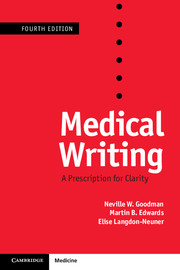Book contents
- Frontmatter
- Dedication
- Epigraph
- Contents
- Foreword
- Preface to the fourth edition
- Layout of the fourth edition
- Preface to the first edition
- Acknowledgements
- Part I Problem: the illness
- Part II Solution: symptomatic relief
- 4 Technology, changing language and authority
- 5 Guidelines to clearer writing
- 6 Spelling
- 7 Is there a better word?
- 8 Superfluous words
- 9 Imprecise words
- 10 Superfluous phrases
- 11 Trouble with short words
- 12 Use of the passive voice
- 13 Consistency: number and tenses
- 14 Word order
- 15 Punctuation
- 16 Circumlocution
- 17 Words and parts of speech for EAL writers
- 18 Clichés and article titles
- 19 Constructing sentences
- 20 Further help with sentences for EAL writers
- 21 Drawing clear graphs
- 22 It can be done
- Part III Practice: recuperation
- Appendix British–American English
- References and further reading
- Index
6 - Spelling
Published online by Cambridge University Press: 05 September 2014
- Frontmatter
- Dedication
- Epigraph
- Contents
- Foreword
- Preface to the fourth edition
- Layout of the fourth edition
- Preface to the first edition
- Acknowledgements
- Part I Problem: the illness
- Part II Solution: symptomatic relief
- 4 Technology, changing language and authority
- 5 Guidelines to clearer writing
- 6 Spelling
- 7 Is there a better word?
- 8 Superfluous words
- 9 Imprecise words
- 10 Superfluous phrases
- 11 Trouble with short words
- 12 Use of the passive voice
- 13 Consistency: number and tenses
- 14 Word order
- 15 Punctuation
- 16 Circumlocution
- 17 Words and parts of speech for EAL writers
- 18 Clichés and article titles
- 19 Constructing sentences
- 20 Further help with sentences for EAL writers
- 21 Drawing clear graphs
- 22 It can be done
- Part III Practice: recuperation
- Appendix British–American English
- References and further reading
- Index
Summary
I have a spelling checker
It came with my pea see
It plainly marks four my revue
Miss takes I cannot sea
I’ve run this poem threw it
I’m shore your pleased too no,
Its letter perfect in it’s weigh
My chequer tolled me sew.
(One of many versions, easily found on the internet, of what originated as ‘Candidate for a Pullet Surprise’, by Mark Eckman and Jerrold H. Zar: see http://grammar.about.com/od/spelling/a/spellcheck.htm.)
No one can pretend that English spelling is easy. French and Italian lose letters that are not pronounced, but are otherwise phonetic. German and Welsh are phonetic. We marvel that those whose first language does not even use English characters ever learn to spell in English. There have been efforts over the years to simplify English spelling, but none has succeeded; nor will they – and nor should they, but this is not the place to present the arguments. Bill Bryson writes of spelling reform (see reference books) that, ‘It is hard to say which is the more remarkable, the number of influential people who became interested in spelling reform or the little effect they had on it.’ According to George Bernard Shaw, the Irish playwright who on his death in 1950 left a bequest to help to reform English spelling, the letters ghoti spelled fish. The bequest had no effect whatsoever, and how ghoti spells fish is revealed at the end of this section. British spelling of English may slowly lose out to American spelling, but that is a different matter. Both spellings occur in this book (see layout of fourth edition), and there are comments where appropriate in the text, as well as a glossary (see appendix).
- Type
- Chapter
- Information
- Medical WritingA Prescription for Clarity, pp. 32 - 45Publisher: Cambridge University PressPrint publication year: 2014



